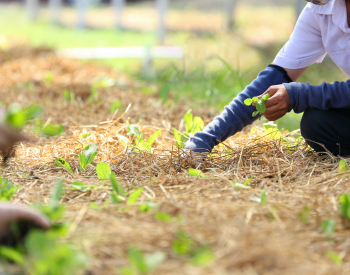Sustainability has become crucial for consumers and businesses across
various industries in recent years. The food industry is one sector that
plays a significant role in shaping our environmental impact. As
consumers become more conscious of their food choices' environmental and
social implications, sustainability certifications have emerged as a
reliable way to identify and support eco-friendly practices. In this
article, we explore the importance of sustainability certifications in
the food industry and shed light on some key certifications that ensure
sustainable practices.
What Is Certified Sustainable Food?
Certified sustainable food refers to products that have been independently verified and approved as meeting specific environmental, social, and ethical standards throughout production, sourcing, and distribution. These standards can vary depending on the certification program or organization involved. Certified sustainable food typically adheres to practices that minimize negative environmental impacts, such as reducing greenhouse gas emissions, conserving water and energy, and promoting biodiversity conservation. It also ensures fair treatment and wages for workers, supports local communities, and emphasizes responsible sourcing and production methods.
What Is Sustainability In The Food Industry?
Sustainability in the food industry refers to producing, distributing, and consuming food in a manner that minimizes negative impacts on the environment and ensures long-term viability. It involves adopting strategies that conserve natural resources, reduce greenhouse gas emissions, protect biodiversity, and promote ethical practices throughout the food supply chain. Sustainable food production minimizes chemical inputs, promotes organic farming methods, and employs efficient water and energy management techniques. Additionally, sustainable food distribution aims to reduce food waste, optimize transportation systems, and support local and regional food networks. Consumers play a crucial role by making informed choices, such as selecting locally sourced and seasonal foods, reducing meat consumption, and supporting fair trade practices. By embracing sustainability in the food industry, we can work towards a healthier planet, healthier people, and a more resilient food system for future generations.
The Growing Importance Of Sustainability Certifications
As global concerns about climate change and resource depletion escalate, consumers increasingly seek sustainable products, including food. Sustainability certifications serve as a beacon, guiding consumers toward products that meet specific environmental, social, and ethical criteria. By choosing products with credible sustainability certifications, consumers can contribute to a greener future and support businesses committed to reducing their ecological footprint.
Key Sustainability Certifications In The Food Industry
- USDA Organic Certification: The United States Department of Agriculture (USDA) Organic Certification ensures that food products are grown, processed, and labeled according to strict organic standards. These standards prohibit the use of synthetic fertilizers, pesticides, genetically modified organisms (GMOs), and irradiation. By choosing USDA Organic-certified products, consumers can support environmentally friendly farming practices.
- Fairtrade Certification: Fairtrade Certification focuses on promoting equitable trade practices and ensuring fair prices and working conditions for farmers and workers in developing countries. In addition, Fairtrade-certified food products help empower marginalized communities and promote social justice in the food supply chain.
- Marine Stewardship Council (MSC) Certification: The MSC Certification focuses on sustainable seafood sourcing. It assures consumers that the seafood they purchase comes from fisheries that adhere to sustainable fishing practices, minimizing negative environmental impacts and protecting marine ecosystems.
- Rainforest Alliance Certification: Rainforest Alliance Certification addresses a range of sustainability issues, including deforestation, biodiversity conservation, fair treatment of workers, and community development. By selecting products with this certification, consumers support companies prioritizing responsible sourcing and production.
Benefits For Businesses
Sustainability certifications not only benefit consumers but also provide advantages for businesses operating in the food industry. By obtaining and displaying credible certifications, companies can enhance their brand reputation, build consumer trust, access new markets, and differentiate themselves from competitors.
Food Labels To Ignore
While food labels can help provide information about the products we consume, not all labels are equally meaningful or reliable. It's essential to be discerning and not solely rely on every label that claims to convey a positive attribute. Here are some food labels that you should approach with caution and consider ignoring.
Natural Or All-Natural
The term "natural" is not clearly defined by regulatory bodies, leading to confusion and potential misuse by food manufacturers. Products labeled "natural" may still contain artificial ingredients, preservatives, or additives. It's best to read the ingredient list and look for specific certifications if you desire natural products.
GMO-Free Or Non-GMO
While genetically modified organisms (GMOs) have been debated, the scientific consensus supports their safety for consumption. Labels claiming "GMO-free" may be misleading, as GMOs in certain foods are often minimal or absent altogether. Instead, focus on understanding the product's overall safety and nutritional value, rather than solely relying on its GMO status.
Free-Range Or Cage-Free
These labels often appear on eggs, poultry, or meat products, suggesting that the animals were raised with access to the outdoors or larger living spaces. However, the terms are not strictly regulated, and the actual conditions in which the animals were raised may not align with consumers' expectations. Look for more stringent certifications like "Certified Humane" or "Animal Welfare Approved" for reliable animal welfare standards.
Pasture Raised
The label "Pasture Raised" is not strictly regulated, and its meaning can vary significantly between producers. Without a recognized certification to back up the claim, there is no standardized criteria or independent verification process to ensure that animals were given access to the outdoors, could forage on grass or natural vegetation, or receive ethical treatment.
Locally Grown
While the idea of supporting local food producers is commendable, the label "local" or "locally grown" can be ambiguous and lack standardized parameters. The definition of what constitutes "local" can vary widely, with no universally agreed-upon distance. To truly engage in buying locally, it is recommended to go beyond relying solely on the label and actively participate in local food initiatives. Visiting farmer's markets, joining community-supported agriculture (CSA) programs, and getting to know local producers are effective ways to ensure you are supporting your community's food system. These direct interactions allow you to better understand where your food comes from, establish relationships with local farmers, and contribute to the local economy.
Build A Greener Future
Sustainability certifications in the food industry serve as valuable tools for consumers and businesses, helping drive positive change toward a more sustainable future. By choosing certified products, consumers can make informed choices that support eco-friendly practices and contribute to the preservation of our planet. On the other hand, businesses can gain a competitive edge by demonstrating their commitment to sustainability through credible certifications. Together, we can build a greener and more sustainable food industry for generations to come.






